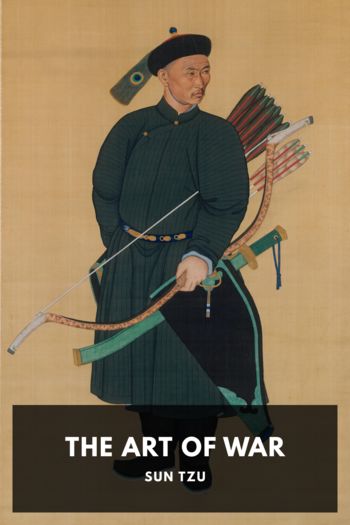Tao Te Ching, Laozi [the gingerbread man read aloud TXT] 📗

- Author: Laozi
Book online «Tao Te Ching, Laozi [the gingerbread man read aloud TXT] 📗». Author Laozi
Such were among the last words of Chuang-tzŭ. His end was not so impressive as that of Confucius; but it was in keeping with the general magniloquence and strong assertion of independence that marked all his course.
Tao Te Ching Part I IThe Tao that can be trodden is not the enduring and unchanging Tao. The name that can be named is not the enduring and unchanging name.
(Conceived of as) having no name, it is the Originator of heaven and earth; (conceived of as) having a name, it is the Mother of all things.
Always without desire we must be found,
If its deep mystery we would sound;
But if desire always within us be,
Its outer fringe is all that we shall see.
Under these two aspects, it is really the same; but as development takes place, it receives the different names. Together we call them the Mystery. Where the Mystery is the deepest is the gate of all that is subtle and wonderful.37
IIAll in the world know the beauty of the beautiful, and in doing this they have (the idea of) what ugliness is; they all know the skill of the skilful, and in doing this they have (the idea of) what the want of skill is.
So it is that existence and nonexistence give birth the one to (the idea of) the other; that difficulty and ease produce the one (the idea of) the other; that length and shortness fashion out the one the figure of the other; that (the ideas of) height and lowness arise from the contrast of the one with the other; that the musical notes and tones become harmonious through the relation of one with another; and that being before and behind give the idea of one following another.
Therefore the sage manages affairs without doing anything, and conveys his instructions without the use of speech.
All things spring up, and there is not one which declines to show itself; they grow, and there is no claim made for their ownership; they go through their processes, and there is no expectation (of a reward for the results). The work is accomplished, and there is no resting in it (as an achievement).
The work is done, but how no one can see;
’Tis this that makes the power not cease to be.38
Not to value and employ men of superior ability is the way to keep the people from rivalry among themselves; not to prize articles which are difficult to procure is the way to keep them from becoming thieves; not to show them what is likely to excite their desires is the way to keep their minds from disorder.
Therefore the sage, in the exercise of his government, empties their minds, fills their bellies, weakens their wills, and strengthens their bones.
He constantly (tries to) keep them without knowledge and without desire, and where there are those who have knowledge, to keep them from presuming to act (on it). When there is this abstinence from action, good order is universal.39
IVThe Tao is (like) the emptiness of a vessel; and in our employment of it we must be on our guard against all fullness. How deep and unfathomable it is, as if it were the Honoured Ancestor of all things!
We should blunt our sharp points, and unravel the complications of things; we should attemper our brightness, and bring ourselves into agreement with the obscurity of others. How pure and still the Tao is, as if it would ever so continue!
I do not know whose son it is. It might appear to have been before God.40
VHeaven and earth do not act from (the impulse of) any wish to be benevolent; they deal with all things as the dogs of grass are dealt with. The sages do not act from (any wish to be) benevolent; they deal with the people as the dogs of grass are dealt with.
May not the space between heaven and earth be compared to a bellows?
’Tis emptied, yet it loses not its power;
’Tis moved again, and sends forth air the more.
Much speech to swift exhaustion lead we see;
Your inner being guard, and keep it free.41
The valley spirit dies not, aye the same;
The female mystery thus do we name.
Its gate, from which at first they issued forth,
Is called the root from which grew heaven and earth.
Long and unbroken does its power remain,
Used gently, and without the touch of pain.42
Heaven is long-enduring and earth continues long. The





Comments (0)